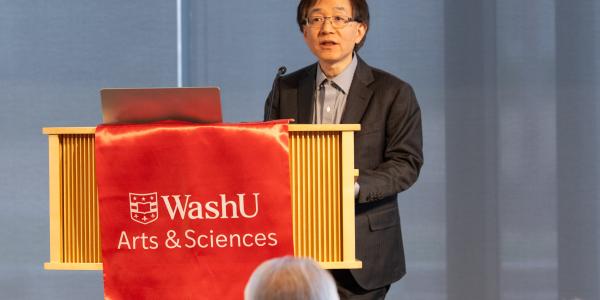Writer, activist, and creative writing instructor Deborah Taffa reflects on her Native American heritage — and the intergenerational burden of trauma — in an upcoming memoir.

As a child on the Yuma Indian reservation in the 1970s, Deborah Taffa rarely heard complaints about her father’s struggle to find work, or her grandparents’ experience in the Federal Bureau of Indian Affairs’ boarding schools of the early twentieth century. Her father preferred not to discuss the history of injustices, and the nuns in the Catholic schools she attended were all but silent on the topic. Nonetheless, Taffa felt the weight of past trauma all around her, in her family’s struggles with poverty and in the constant pressure from her father to succeed.
In her upcoming memoir, Whiskey Tender: Memoir of an Indigenous Childhood, Taffa, who teaches non-fiction writing at Washington University and Webster University, confronts the weight of history, the colonial violence that shapes her family’s past, and the complexity of modern Native American identities.
Taffa’s work is shaped by postcolonial trauma — physical, cultural, and spiritual — resulting from generations of violence inflicted by the United States government against the Yuma and Laguna Pueblo people of Arizona and New Mexico. “I can track the history of government policies — the Native American boarding schools, the Indian Relocation Act, and other assimilation practices — as they affected my family through the generations,” she said.
It was an honors class in high school that first allowed Taffa to name the trauma in her family’s past, a disorienting experience she thinks of as a blessing, yet terms “the wounding of an education.”
“I was confronted with the facts of the Indian wars, Wounded Knee, Sand Creek, and other violent events in a classroom with a lot of white students,” Taffa reflected. “The spotlight felt glaring, and I grew very depressed. My twenties were a difficult time.”
Taffa can trace her heritage to a number of different Native American tribes — Laguna Pueblo, Paiute, Kwatsaan — and points to her childhood experience at the intersection of those diverse cultural traditions as itself a product of the dislocation inflicted by government policy in boarding schools, which resulted in an era of intertribal marriage. “Our house was a medley of indigenous languages and indigenous cultures,” she recalled of her childhood. “A lot of people don’t realize that we [Native Americans] are actually quite diverse in our language groups, religious beliefs, and traditions.”
Her journey to becoming a writer was a searing task of self-examination, one in which she turned to history as a means of learning about herself. For most of her life, Taffa taught herself in private. “I stared to see memory as a political act,” she said. She only formalized her education later in life, as a non-traditional student. After an initial college education at Webster University, she opted, as a mother of five, to enroll in a graduate program in Creative Writing at the University of Iowa. “I had lived an entire life,” she said. “I was 39 and it was a three-year program, one of the best in the country.”
She identifies her own story with those of the students of color she teaches both here at WashU and at Webster University. “I think it’s important for professors to remember that when you have students of color who are writing and telling stories, they are on a spectrum of discovery that requires a great deal of strength,” Taffa said. With curricula balanced toward the perspective of white settlers, “research for a writer of color will often involve confronting unknown details, dark pockets, even surprises when it comes to their family history.” Taffa’s task is to support students in this journey.

One perspective she takes is to encourage her students to embrace the myths at the heart of their own cultures. Taffa believes that Western culture has grown to accept the myths it tells itself as truths while dismissing the perspectives of non-Western cultures as “superstition.” In the quest to be taken seriously, non-Western writers have often felt pressure to conform to Western cultural touchstones and assumptions in their writing. Writing from their own perspective not only challenges the hegemony of those assumptions, it makes for better and more compelling stories, Taffa said.
Taffa encourages her students to embrace their heritage yet recognizes that the concept of “heritage” is complex — something she continually grapples with in all of her work. She is determined to avoid the pitfall of what she terms “museum culture,” or the elevation of an “authentic” — and thus static and unchanging — idea of Native American culture in the public mind. She worries that Native Americans “want to keep our cultures very pure and Old World…we will become glass-encased cultures if we let this happen.” While Taffa understands the impulse to want to preserve Native American heritage after generations of attempts to eradicate it, museum culture can play into the myth that Native American culture is nothing more than a relic of the past.
“The only things that are in a museum are dead,” Taffa said. Native American culture, she contends, should be allowed to grow and change like any other. She points to women like newly elected representatives Sharice Davids (D-KS) and Deb Haaland (D-NM) as the face of a new, more complex picture of modern Native America.
Taffa takes her educational mission, of presenting Native American culture as vibrant, alive, and fundamentally modern, beyond the classroom. As a freelance writer, she has essays published or forthcoming in the LA Review of Books, Salon, The Rumpus, A Public Space and The Best American series. As an executive board member with the Missouri Humanities Council, she was instrumental in the creation of the state’s Native American Heritage Program. Recently, she has worked on a project to map the Trail of Tears in Missouri and to build a museum to memorialize Native American displacement. She was also a writer for “Digadohi: Lands, Cherokee, and the Trail of Tears,” which will air on PBS in 2020. Through all these efforts — during Native American Heritage month and throughout the year — Taffa seeks to bring a more nuanced understanding of Native American “heritage” to the public and her students.




